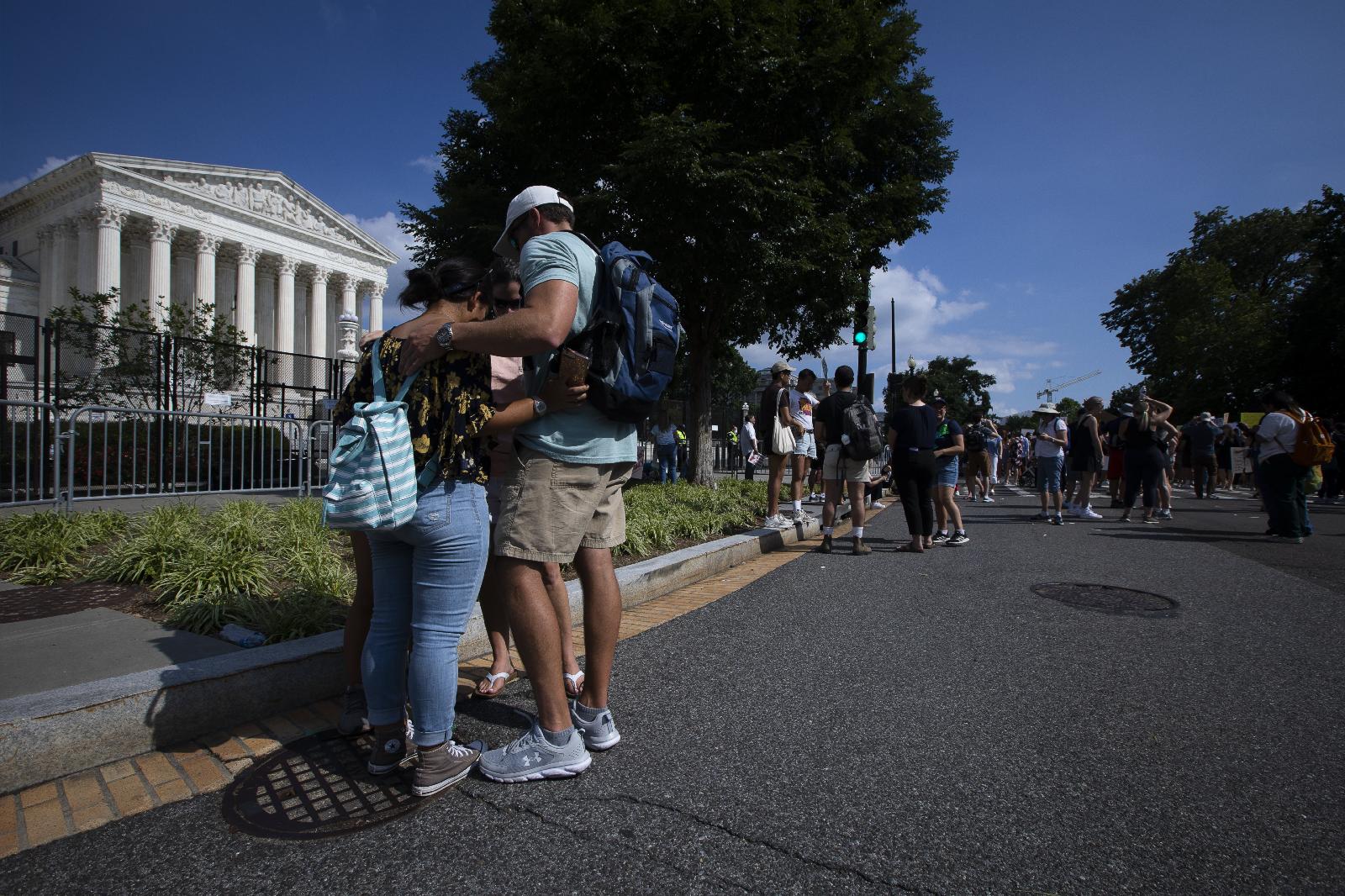The decision by the US Supreme Court to overturn Roe v Wade, the 1973 Supreme Court decision that established a constitutional right to procure an abortion, has sent the same kind of political shockwaves through the nation that the original 1973 decision did.
Pro-choice protesters took to the streets of many major cities protesting the decision as trigger laws took effect as soon as Roe was overturned, meaning abortion is now banned or mostly banned in ten states. Legal analysts predict the procedure will be banned in another five states within the month, an additional five states are likely to ban it sometime this year while 19 states have laws making abortion legal, placing virtually no restrictions on the procedure.
The court ruled 5-4 that the issue of abortion should be left to the individual states to regulate or ban as they see fit. “The Constitution does not confer a right to abortion; Roe and Casey are overruled; and the authority to regulate abortion is returned to the people and their elected representatives,” the majority opinion states.
Writing for the court, Associate Justice Samuel Alito confronted the legal logic of Roe, and its successor case, Planned Parenthood v Casey in 1992. Roe based its decision on a “right to privacy” that, though unmentioned in the text of the US Constitution, is implied in several articles in the Bill of Rights. Alito dismissed that reasoning as fanciful: “Without any grounding in the constitutional text, history, or precedent, Roe imposed on the entire country a detailed set of rules for pregnancy divided into trimesters much like those that one might expect to find in a statute or regulation.”
Casey argued the “liberty” in the Fourteenth Amendment’s “Due Process” clause protected the right to abortion. Alito’s decision is equally dismissive of that argument, noting the Court has acknowledged the need for “substantive Due Process” only when the right at issue is explicitly mentioned in the Constitution, when the right is “deeply rooted in [our] history and tradition,” or it is considered essential to the “ordered liberty” the Constitution was designed to enact. Alito noted abortion is unmentioned in the Constitution and denied that the right to procure an abortion was “deeply rooted” in the country’s history or traditions or essential to ordered liberty.
Justice Alito also confronted the argument that the jurisprudence flowing from Roe and Casey, concerning contraception, intimate relations and same-sex marriage, all of which argued along similar lines about a right to privacy or raising substantive due process concerns, would be threatened by their decision in this case. “To ensure that our decision is not misunderstood or mischaracterised, we emphasise that our decision concerns the constitutional right to abortion and no other right,” Alito wrote. “Nothing in this opinion should be understood to cast doubt on precedents that do not concern abortion.”
Justice Clarence Thomas joined the majority but issued his own concurring opinion in which he encouraged plaintiffs to bring cases that would expand the court’s focus to include possibly overturning same-sex marriage and the right to use contraception.
Chief Justice John Roberts agreed with the court majority that the Mississippi law barring most abortions after 15 weeks should be upheld, but he did not join the majority of the court in its decision to go further and overturn Roe, citing his belief in judicial restraint. “If it is not necessary to decide more to dispose of a case, then it is necessary not to decide more,” he wrote.
The court’s three liberal justices, Stephen Breyer, Sonia Sotomayor and Elena Kagan, issued a dissent, arguing the now overturned rulings struck the right balance between the unborn child’s right-to-life and the woman’s right to bodily autonomy. “Today, the Court discards that balance. It says that from the very moment of fertilisation, a woman has no rights to speak of,” they wrote. “A State can force her to bring a pregnancy to term, even at the steepest personal and familial costs.”
Reaction from Catholic leaders to the Supreme Court’s decision to overturn Roe v Wade was singularly focused on the need to provide pregnant women and young mothers the kinds of support they need and without which they might previously have turned to abortion.
Boston Cardinal Sean O’Malley, a longtime leader in the pro-life movement, said: “This decision will create the possibility of protecting human life from conception; it calls us to recognise the unique burden faced by women in pregnancy; and it challenges us as a nation to work together to build up more communities of support – and available access to them – for all women experiencing unplanned pregnancies.
“I welcome the Court’s decision, but I do not underestimate how profoundly divisive the issue of abortion has been and will continue to be in our public life,” O’Malley added. “Even more tragic has been the personal suffering of women facing unplanned pregnancies in difficult situations. The Church has consistently opposed the moral and legal dimensions of Roe v Wade; we also adamantly reject stigmatising, criminalising, judging or shaming women who have had abortions or are considering them. Too often isolated and desperate, women have felt they had no other choice. They need and deserve spiritual, emotional, and material support from the Church and from society.”
Chicago Cardinal Blase Cupich also called recommitting the Church to supporting women facing crisis pregnancies. “This moment should serve as a turning point in our dialogue about the place an unborn child holds in our nation, about our responsibility to listen to women and support them through pregnancies and after the birth of their children, and about the need to refocus our national priorities to support families, particularly those in need,” Cupich said.
Sr May Haddad, RSM, president and CEO of the Catholic Health Association, representing the nation’s Catholic hospitals, issued a statement that read: “In Catholic health care, we do not perform elective abortions as it is counter to our mission, our values, and our faith. Members of CHA will continue to provide women, children, and families with the highest standards of medical care.”
President Joe Biden criticised the court’s decision, calling it “a realisation of an extreme ideology and a tragic error by the Supreme Court, in my view” and blaming the three justices appointed by his predecessor, President Donald Trump for the outcome. For his part, Trump shared credit for the decision with the divinity, saying in an interview that “God made the decision,” while issuing a statement that said this, and other conservative court victories, “were only made possible because I delivered everything as promised, including nominating and getting three highly respected and strong Constitutionalists confirmed to the United States Supreme Court”.
*On the day that the US Supreme Court issued the deci- sion overturning the constitutional right to an abortion that was enshrined in the 1973 Roe v. Wade decision, the Pontifical Academy for Life released a statement concurring with the response of the US bishops and calling the decision a challenge to every country in the world (writes James Roberts).
“The court’s opinion shows how the issue of abortion continues to arouse heated debate. The fact that a large country with a long democratic tradition has changed its position on this issue also challenges the whole world,” the Vatican academy under its President Vincenzo Paglia wrote in a statement on June 24 – the first official reaction to the court’s decision issued by a body linked to the Roman Curia.
Calling for legislative measures that support the family and motherhood, the academy demanded “solid assistance to mothers, cou- ples and the unborn child that involves the whole community”, endorsing the US bishops’ assertion that the decision showed that it was time “to build a society and economy that supports marriages and families”.
The following day, Pope Francis delivered the homily at a Mass celebrated by Cardinal Kevin Farrell, the prefect of the Dicastery for Laity, Family, and Life, for the World Meeting of Families.
“All of you married couples, in building your family, made, with the help of Christ’s grace, a courageous decision: to use freedom not for yourselves, but to love the persons that God has put at your side,” Pope Francis said.
He advised parents “not to shield our children from the slightest hardship and suffering, but to try to communicate to them a passion for life, the passion to arouse in them the desire to discover their vocation and embrace the great mission that God has in mind for them.”
“In praising the beauty of the family, we also feel compelled, today more than ever, to defend the family,” Pope Francis said.
“Let us not allow the family to be poisoned by the toxins of self- ishness, individualism, today’s culture of indifference and culture of waste, and as a result lose its very DNA, which is the spirit of acceptance and service.”



 Loading ...
Loading ...